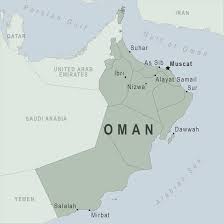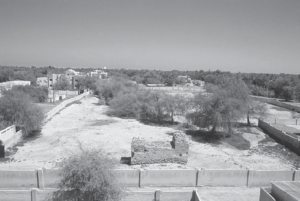 In 1835, there were 20 Jewish families with a small synagogue at Sohar and several individuals, who had fled Iraq, in Muscat. The Jews were not obliged to wear any badge and could live where they wanted.
In 1835, there were 20 Jewish families with a small synagogue at Sohar and several individuals, who had fled Iraq, in Muscat. The Jews were not obliged to wear any badge and could live where they wanted.
They were engaged in lucrative activities – silversmithing, money lending and retailing liquor. By the end of the century the only reference to Jews was in the manufacture of fired bricks. All that remained, in Sohar, was a Jewish cemetery containing around 200 graves with Jewish names in Hebrew characters.
During World War II, a Jewish American Army enlisted man, encountered a small community of Omani Jews in Muscat, but this community consisted mostly of recent migrants from Yemen.
 In 1948 there was a recorded Jewish population of 5,000. These mostly lived in Muscat and a few hundred in Ibri. This Jewish population decreased during the early 1950s when mass emigration of Jews leaving the Arabian Peninsula occurred. Today the community no longer exists and most of the Jews who lived in Oman now live in Israel.
In 1948 there was a recorded Jewish population of 5,000. These mostly lived in Muscat and a few hundred in Ibri. This Jewish population decreased during the early 1950s when mass emigration of Jews leaving the Arabian Peninsula occurred. Today the community no longer exists and most of the Jews who lived in Oman now live in Israel.
Oman does not have any formal relations with Israel, but from 1996 to 2000 the two countries did have exchange offices. Diplomatic relations between Israel and Oman were cut off from 2000 at the start of the second intifada.
In response to the Iranian threat, which is just across the gulf, the Omani government has started to reach out to Israel and the Jewish community.